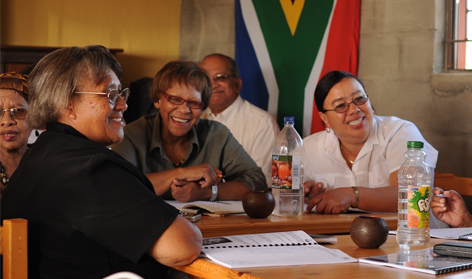Waste: Shamina Shawena - It's mine It's yours

Engaging in discussion
Dr Ryan Woodard is currently working with the Dreamcatcher Foundation on the Waste: Shamina – Shawena - Waste: It’s Mine – It’s Yours project. This ongoing project aims to increase awareness of public health and waste issues in communities throughout South Africa.
The Dreamcatcher Foundation works with impoverished communities across South Africa to develop skills and knowledge so they can manage their own future. Over the past 25 years it has worked on numerous community based initiatives including poverty alleviation programmes, projects with street children and abused women, life skills training and entrepreneur encouragement and support. Special emphasis has been placed on the ability of women caught in the poverty trap, using tourism as generator of income: offering a sustainable solution to unemployment and poverty alleviation.
In March a series of 3 waste management workshops were held in Kayamandi (in Stellenbosch), Melkhoutfontein (in Stilbaai) and Stutterheim. The workshops were targeted at Kamammas & Bhutis – these are small tourism enterprise service providers and local community leaders, who are affiliated to the Dreamcatcher Foundation. Kamammas and Bhutis representing various cultures and geographical regions attended including Cape Town, Darling, Upington, Leliefontein, Kayamandi, Stellenbosch, Paarl, Klapmuts, QwaQwa (town of Phuthadiitjhaba), Melkhoutfontein, Riversdale, Albertinia, Heidelberg, Knysna, Oudtshoorn, Worcester, Stutterheim & Witsieshoek district. Importantly representatives from local authorities were also invited.
The workshops consisted of talks, interactive exercises and project work with the aim of increasing awareness at the source of waste generation and included:
• Talks on waste management in South Africa including how waste is currently managed and the government’s National Waste Management Strategy;
• Group discussions on the problems associated with waste including the environmental and health impacts on the community and their tourism business;
• Analysis of rubbish being thrown out and consideration of what can be done with the waste i.e. is it recyclable, are there any local services available;
• Group work to develop a communication tool/artwork to increase awareness of waste issues;
• Sharing of ideas on how Kamammas can reduce/reuse waste through repairing items, recipes for leftover food, localised schemes in place. These ideas are being collated into a prevention manual for the Kamammas;
• Group discussions on what support is needed in their communities i.e. improved services, support, education programmes.
An important part of the project was bringing the community together with council official to discuss waste issues, highlight local problems and to work together to find solutions.
The training also included demonstrating and installing Green Johannas the first Green Johannas in South Africa. The Green Johanna is a Swedish designed composter which operates with 2/3 food waste and 1/3 garden waste. It is a fully enclosed unit and can accept meat, fish and processed food which cannot be placed in a conventional composter.
The project team also visited waste facilities, met with council staff and Universities to develop links and further projects.
The legacy of the project so far has included:
• Empowering trainees to be community leaders & champions for waste – they are already reducing levels of waste set out for collection;
• Worcester - meeting with local councillors to discuss waste issues;
• Kayamandi - developing a proposal to put to councillors for implementing a local recycling scheme & a trial of real nappies;
• Darling - writing a comedy drama to increase awareness of waste issues that will be included in the community arts festival in September;
• Stilbaai - youth brigade met with the other youth and a community clean up has began;
• Kamammas who are teachers integrating waste into the school curriculum and running of the school;
• Developed posters for a communication campaigns;
• Developed a waste information manual that will be disseminated to Kamammas;
• Training is not isolated - ongoing support to communities on daily basis.
Waste: Shamina-Shawena is an excellent example of the private, charitable sectors, communities and academia working in partnership. The South African government recognises there is a lack of awareness of waste We are currently looking to develop further projects and training opportunities in South Africa.
For more information please contact Dr Ryan Woodard.



